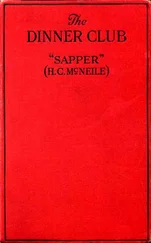“ ‘It was good of you to come, sir,’ he said. ‘Very good.’ And then he turned to his wife and I heard him say: ‘Have you told him yet, Kitty?’
“She shook her head. ‘Not yet, darling, I will now.’ She left his side and came over to me.
“ ‘Mr. Trayne, I know you thought me very peculiar at the theatre. But I was afraid that if I told you what I really wanted you’d have refused to come. You get hundreds and hundreds of people coming to see you who think they can act. Asking you to help them get a job and that sort of thing. Well, I was afraid that if I told you that that was what I wanted, you’d have told me to go away. Perhaps you’d have given me a straw of comfort—taken my address—said you’d let me know if anything turned up. But nothing would have turned up. . . . And, you see, I was rather desperate.’
“The big brown eyes were fixed on me pleadingly, and somehow I didn’t feel quite as annoyed as I should have done at what was nothing more nor less than a blatant trick to appeal to my sympathy.
“ ‘Perhaps nothing would have turned up,’ I said gently, ‘but you must remember that to-day the stage is a hopelessly overstocked profession. There are hundreds of trained actors and actresses unable to obtain a job.’
“ ‘I know that,’ she cried eagerly, ‘and that’s why I—why I thought out this plan. I thought that if I could really convince you that I could act above the average . . .’
“ ‘And she can, Mr. Trayne,’ broke in her husband. ‘She’s good, I know it.’
“ ‘We must leave Mr. Trayne to be the judge of that, Harry,’ she smiled. ‘You see,’ she went on to me, ‘what I felt was that there is an opening for real talent. There is, isn’t there?’
“ ‘Yes,’ I agreed slowly. ‘There is an opening for real talent. But even that is a small one. . . . Have you ever acted before?’
“ ‘A little. In amateur theatricals!’
“I turned away. Amateur theatricals! More heart-burning and disappointment has been caused by those abominable entertainments than their misguided originators will ever realise.
“ ‘But don’t think I’m relying on that.’ The girl was speaking again, and I almost laughed. ‘I want you to judge me to-night.’
“I swung round and looked at her. So this was the mysterious plan: I was to witness an impromptu performance, which was to convince me that the second Sarah Bernhardt had been discovered.
“ ‘I couldn’t have shown you, you see, in your dressing-room. I shouldn’t have had time. That’s why I asked you to come here.’
“ ‘You have the courage of your convictions anyway,’ I said quietly. ‘I am perfectly ready to be convinced.’
“ ‘Then will you sit there.’ She took off her hat and coat as I sat down on the only available chair, and from underneath his pillow the man produced a paper-covered book.
“ ‘You’ll forgive me if I read my lines, Mr. Trayne,’ he said. ‘I find I can’t learn them—I can’t concentrate.’ He passed a thin, emaciated hand over his forehead. ‘And it’s her you want to see.’
“He turned over the pages weakly; then he began to read. And I—I sat up as if I’d been stung. At last everything was clear: the continual visits to the theatre—everything. The part of all others which they had selected to prove her ability, was the love-scene between Molly Travers and myself in the third act of ‘John Pendlesham’s Wife. . . .’ ”
For a while there was silence, while the Actor thoughtfully lit another cigarette.
“This unknown child,” he went on after a moment, “who had acted a little in amateur theatricals, had deliberately challenged London’s greatest emotional actress in her most marvellous success before, Heaven help us, me—of all people. I suppose if I was writing a story I should say that she triumphed; that as I sat in that bare and hideous room I realised that before me was genius—a second and greater Molly; that from that moment her foot was set on the ladder of fame, and there was no looking back.”
The Actor laughed a little sadly. “Unfortunately, I’m not writing a story, I’m telling the truth. I don’t know how I sat through the next twenty minutes. It was the most ghastly caricature of Molly that I have ever thought of; the more ghastly because it was so intensely unintentional. Every little gesture was faithfully copied; every little trick and mannerism had been carefully learnt by heart. And this, as I say, to me who acted with that divine genius every night. God! it was awful. That marvellous line of Molly’s, when, standing in the centre of the stage facing me across the table, she said: ‘Then you don’t want me back?’ that line which was made marvellous merely through the consummate restraint with which she said it, sounded from this poor child like a parlour-maid giving notice.
“And then, at last it was over, and I realised I had to say something. They were both staring at me, hope shining clear in the girl’s eyes and pride in the man’s.
“ ‘She’s great, isn’t she, Mr. Trayne?’ he said. ‘I’ve not had the privilege of seeing you and Miss Travers in the part—but I feel that now—why,’ he gave a little shaky laugh, ‘that it’s hardly necessary.’
“You see,” said the Actor slowly, “that was the devil of it all. They were both so utterly certain, especially the man. The difficulty had been to get me there; after that it had been easy. I glanced at the poor fellow in the bed, and his thoughts were plain to read. No more grinding poverty, no more unfurnished bed-sitting rooms, and—fame for the woman he loved! And then he spoke again.
“ ‘I’m such a hopeless crock, Mr. Trayne, and she’—he took one of her hands in both his own—‘she’s had to do all the work. Beastly, grinding work in an office, when she was capable of this.’
“The girl bent over him, and I looked away. It seemed to me that the ground on which I stood was holy.”
The Actor gave a short laugh which deceived no one. “I suppose I was an ass,” he went on, “but I’d do it again to-day. ‘It was wonderful,’ I said, ‘quite wonderful.’ And because I’m an actor they believed me. Not that he, at any rate, required much convincing—he only wanted his knowledge confirmed. Of course, when I spoke I didn’t realise what I was letting myself in for. I should have done, I suppose, but—I wasn’t left long in doubt. If she was wonderful—and had not I, Herbert Trayne, said so—what about a job? At once . . . With my backing it was easy. . . . Which was all quite true except for the one vital fact of my having lied. But, hang it, you fellows!” he exploded, “could you have told ’em it was the most appalling exhibition of utter futility you’d ever witnessed?”
“No, I couldn’t,” said the Soldier. “What happened?
“I can see them now,” continued the Actor. “He was holding her hand, and looking up into her face—as a dog looks at the being it adores. And she was smiling a little, and crying a little—tears of pure joy. The strain was over, the lunches had not been missed in vain. And I stood there like a dumb idiot racking my brains for something to say. They thought I was wondering what job to offer her; they were right, I was.” The Actor laughed shortly.
“But I’d gone into the morass, and there was nothing for it but to blunder in deeper. The one vital essential was that in no circumstances must the poor child ever be allowed to act. The other was money—and at once. So I offered her then and there a job as Molly Travers’ understudy at five pounds a week.”
“Great Scott!” The Doctor sat up with a jerk. “Understudy Molly?”
“I explained, of course,” went on the Actor, “that there was an understudy already, and that to save unpleasantness it would be better if she didn’t come to the theatre, unless I sent for her. That, of course, it was more than likely that Miss Travers wouldn’t be ill during the run of the play, and that in those circumstances I didn’t want to offend the present understudy. And when another play came along, we must see what we could do. That, thank Heaven, I knew was some way off yet! It gave me breathing space.
Читать дальше












